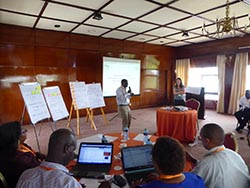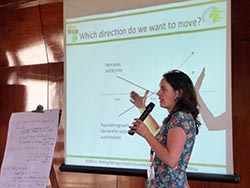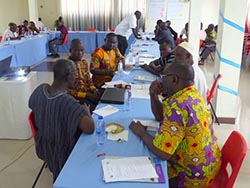Last year, N2Africa was selected as one of the six in-depth case studies within the PROIntensAfrica Initiative (www.intensafrica.org). PROIntensAfrica aims to build a long-term research and innovation partnership between Africa and the European Union, focusing on the improvement of food and nutrition security through sustainable intensification. Since N2Africa’s selection as case study, a literature study, stakeholder interviews and household level survey were held in the two countries involved in this study: Kenya and Ghana. As a final activity of the in-depth case study, stakeholder workshops were held in both countries (June 21st in Kisumu, western Kenya and June 23th in Tamale, northern Ghana).
The objectives of the workshops were to verify and deepen the results of the literature study, interviews and surveys in western Kenya and northern Ghana on drivers of change in agriculture. Building on this, priority areas for research on the role of legumes in sustainable intensification were identified in the second half of the workshop.
|
Figure 1. Identifying priority areas for research for the role of legumes in sustainable intensification in Kisumu, western Kenya (Fred Kanampiu and Esther Ronner presenting) |
The workshops started by presenting and discussing the drivers of change that play a role in Kenya and Ghana. Feedback during the workshop clearly deepened mutual understanding of these drivers. For example in Ghana, improved education and low profitability (due to small farm size) was brought up as a reason why the youth has lost interest in farming. In both countries, government policies on agriculture, as a driver of change, were renamed to poor government policies for agricultural development. Poor policies and poor funding affect extension work in particular, resulting in fewer extension workers on the ground in both countries. Recently, however, a local government body in Kenya (Migori county) has adopted soyabean as alternative for traditional cash crop such as tea and tobacco. The local government body is promoting soyabean using N2Africa’s advice on input use. A key issue remains the poor linkages between smallholder soyabean farmers and output markets. These poor linkages were further discussed as a priority area for research in the second half of the workshop. Ideas were discussed on how for instance a ‘legume board’ or legume stakeholder platform could be initiated on local or national level that could facilitate improved linkages and also help to push for subsidies on legume inputs (e.g. inoculants, P-based fertilizers). |
| Developing farming as a business was identified as another priority area for research in both countries. Value addition to legumes through small to medium scale enterprises could for instance make farming more profitable and provide employment in the value chain for the youth, who do not want to or cannot work in farming anymore. Finally, in both workshops, a clear priority area was identified for providing specific advice to farmers. ‘What legume (including currently less cultivated legumes, such as green gram or climbing bean) can be grown where?’, ‘With which inputs?’ and ‘What could be the expected yield and profit in farmers’ fields?’ were clear questions that came out in western Kenya. Making such information available for extension workers and NGO’s on ICT platforms, such as mobile app’s, could increase the effectiveness of advice to farmers. |
Figure 2. Lively discussions between farmers, researchers and NGO’s in Tamale, northern Ghana making clear that further development of the seed and agri-input sector is still needed to make legume cultivation more profitable |
Once more, we want to thank all participants of the workshops for their contributions in these fruitful events! The workshop reports are online on the N2Africa website: see the links for northern Ghana and western Kenya.
Wytze Marinus, Wageningen University, The Netherlands



